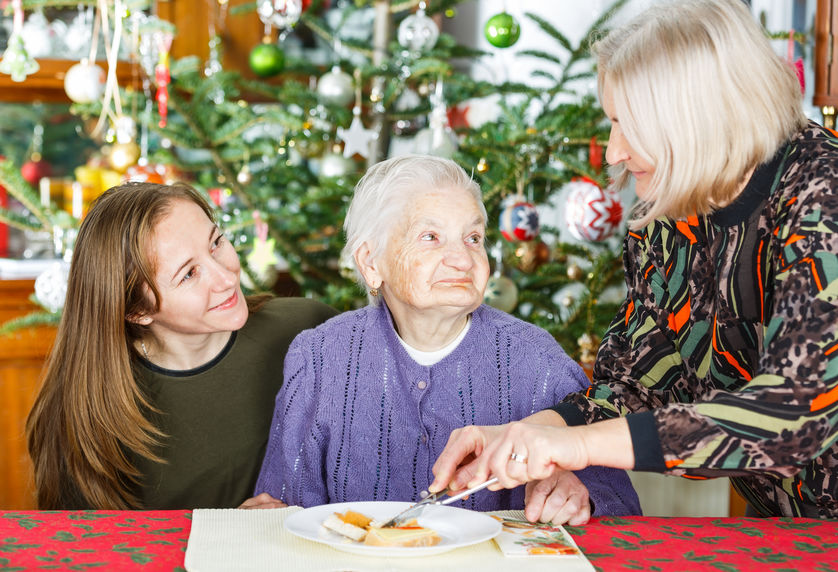Holiday Season Checklist for Visiting Nursing Homes or Assisted Living Facilities
December 5, 2018 | Category: Nursing Home Neglect/Abuse | ShareFamilies and friends are important during the holidays, some of whom may be in nursing homes or assisted living facilities. When visitors come to these facilities, it is the perfect time to not only have enjoyable visits, but also to give the resident the best holiday gift ever. That holiday gift is the gift of safety.
 As of 2014, the Centers for Disease Control estimated there were 1.4 million residents in facilities across the United States and 1.7 million licensed beds.
As of 2014, the Centers for Disease Control estimated there were 1.4 million residents in facilities across the United States and 1.7 million licensed beds.
In 2016, the National Study of Long-Term Care Providers showed that 22 percent of current residents living in residential care communities had a fall in the previous 90 days, representing 175,000 residents in the United States. “By region, 27 percent of residents living in communities in the Northeast, 23 percent of residents in Midwest communities, and 20 percent of residents in communities in the South and West, respectively, had a fall. A higher percentage of residents in the Northeast had a fall compared with residents in the South and West.”
The environment and personnel often change at facilities, so it is important to constantly be vigilant. One of the first things a visitor should do is to come at different times during the day and to do so unannounced. Having a checklist for these visits can be important in making sure your loved one or friend is safe, happy and stimulated. Here are some of the things SeniorHomes.com say you should be observing:
- Is the facility in good shape physically? Is there fresh paint, nice landscaping, clean sidewalks and patios.
- Do the hallways and public areas smell fresh and free of unpleasant odors? Are public restrooms kept clean for visitors?
- Do the residents appear well-groomed, dressed appropriately, engaged in activity?
- Are the staff members interactive and friendly with residents, visitors and one another?
- What is the ratio of staff to residents on a daily basis? Per shift? What training and qualifications are required of caregivers if they are not licensed nurses?
Questions about the services and service level:
- How long, on average, do residents wait when they request help using a call button?
- Do caregivers regularly work double shifts? This should be the exception to the rule as fatigue leads to medication errors and less compassionate care.
- How often are care conferences scheduled among primary staff members and family to discuss, monitor and adjust the care provided to residents?
- Are the orders determined by care conferences and physicians followed accurately to ensure progress is made through therapies?
- What types of activities are available to residents and is the posted schedule of activities followed?
- Is transportation available for off-site medical appointments and/or can staff members coordinate transportation? This is particularly important if family members cannot provide transportation.
In addition, visitors should take note of any physical problems a resident might have, such as bruising. These can be the result of mistreatment.
“We at Spivey Law Firm, Personal Injury Attorneys, P.A. wish everyone a very happy and safe holiday. Should you or a loved one be injured as the result of negligence on the part of a facility, or a facility’s employees, please contact us. There are no costs or attorney fees unless we make a monetary recovery for you,” said Fort Myers Nursing Home Abuse Lawyer, Randall Spivey.
Florida Nursing Home Negligence Attorney,Randall L. Spivey is a Board Certified Civil Trial Attorney – the highest recognition for competence bestowed by the Florida Bar and a distinction earned by just one (1%)percent of Florida attorneys. He has handled over 2,000 personal injury and wrongful death cases throughout Florida. For a free and confidential consultation to discuss your legal rights, contact the Spivey Law Firm, Personal Injury Attorneys, P.A., in Lee County at 239. 337.7483 or toll free at 1.888.477.4839, or by email to Randall@SpiveyLaw.com. Visit SpiveyLaw.com for more information. You can contact Spivey Law Firm, Personal Injury Attorneys, P.A. in Charlotte County at 941.764.7748 and in Collier County 239.793.7748.

